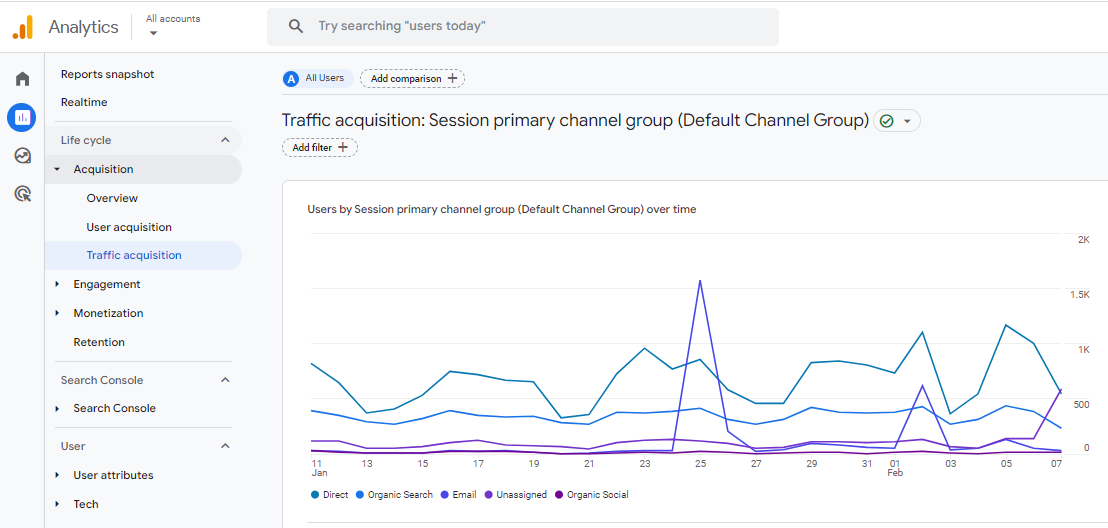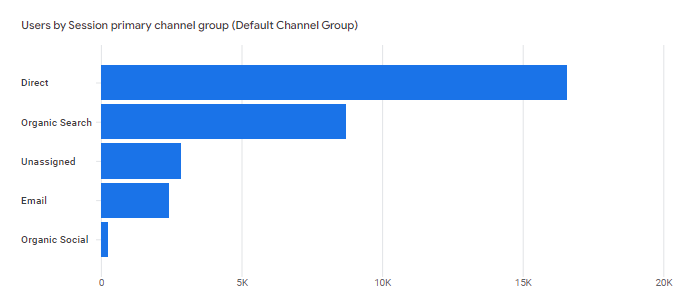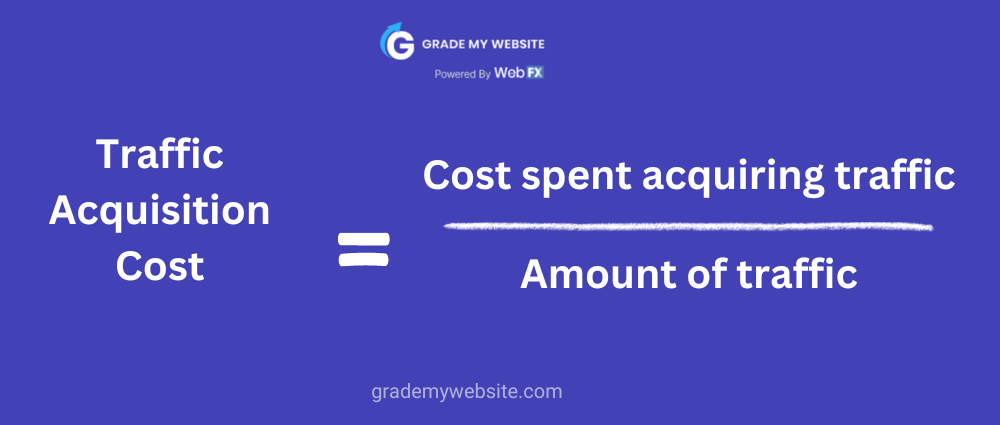Traffic Acquisition: Costs, Benefits, and Why It Matters
What are traffic acquisition costs? Traffic refers to any visitor who starts a new session – the time a user is active – on your site or app.
Traffic acquisition involves getting visitors to your website through search engines. With traffic acquisition, you can increase your chances of finalizing leads and moving customers through the sales funnel.
Traffic acquisition costs (TAC) are the expense of gaining qualified traffic to your pages. Every company with a website for monetization has some costs for acquiring traffic.
Why traffic acquisition matters?
Since the release of Google Analytics 4, businesses have had more insight into how people find their sites. The traffic acquisition reports show how people find your site, what actions they take, and where you need to improve.

Web traffic is a familiar concept, but our understanding changes as technology improves. Whether you’re just starting with your marketing plan or need to update your approach, understanding traffic acquisition can help you target the right group and grow your site.
3 benefits of traffic acquisition
Traffic acquisition helps you grab users’ attention in a crowded online market. You can accomplish the following by understanding the traffic your site generates.
1. Targeting the right audience
Your target audience comprises those most likely to benefit from your goods or services. As you break down who is coming to your site and spending the most time there, you can understand who to aim your ads and marketing toward.
You can also optimize your site for people most likely to land on it.
2. Limiting extra spending
Spending money on marketing is necessary for any business, even if you operate in-house. By analyzing traffic acquisition costs and how they compare to your users, you can see where people are coming from and where your efforts can use some work.
If you don’t break down your traffic, you won’t know how your audience finds you. With traffic analysis, you can start investing in successful marketing campaigns.
3. Increasing revenue
Marketing is an investment in your company’s future. Even though you might need to spend more on your advertisements to reach your audience, in the end, you will make more money as your site grows.
Budgeting for traffic acquisition costs
Marketing budgets are complex, like the goals you hope to achieve with them. Traffic acquisition cost is only one cost to account for, but you need to consider how much you’ll spend on improving your traffic ratings.
For example, consider factors like:
- Equipment: Do you have all the technical equipment to perform your marketing tasks?
- Team: Does your company have internal resources, or will you outsource your marketing?
- Competitors: Do you know what your competitors are spending on TAC?
- Allocation: Are you spending all your funds on one campaign? How is that campaign going?
You have to invest in your marketing campaign to ensure a quality return on investment (ROI). Using Google Analytics – or another marketing analytics tool – can help you see areas of improvement to maximize your budget.
How web traffic affects marketing?
Once you understand traffic and how Google categorizes it, you can start shaping your marketing strategy to your goals. Below are some ways that your traffic can impact your marketing plan.
Traffic sources and mediums
Google gathers information about each user that comes to your website using their code. Knowing where they are coming from and how they access your site can show you where your marketing is working and where you can make changes.

You can break your web traffic down into sections that describe how a user found and landed on your site:
- Organic: Users who arrive at your site through a non-paid search result.
- Cost-per-click (CPC): Users who click on a paid advertisement on a search engine.
- Referrals: Traffic from users who click on your ad on a site other than a search engine.
- Email: Traffic that comes from an email marketing campaign.
- None: Users who type your website directly into a browser.
The source describes where the traffic originated, while the medium describes how it got there. Let’s say a user found you while conducting a Google search where you were at the top of the results. The source would be Google, and the medium would be organic.
FAQs about traffic acquisition costs
How do you calculate TAC?
The basic formula for calculating traffic acquisition cost is dividing the costs spent on earning traffic by the amount of traffic recorded during a period.

Your net revenue — how much you earn after paying for traffic — can also hint at your acquisition cost. The bottom line is that you need to make more than you spend, so pay attention to your expenses versus earnings.
You can also use a customer acquisition cost (CAC) calculator to learn how much you spend to acquire each customer.
Are traffic acquisition and user acquisition the same?
Traffic and user acquisition might seem the same at first, but they have unique definitions per the Google Analytics report:
- Traffic acquisition: Shows you where new sessions come from, regardless of the user.
- User acquisition: Describes new users seeing your site for the first time.
You can view traffic and user acquisition reports with the Google Analytics update. Before, these were lumped together, but now you can dive deeper into your site metrics.
Learn more from WebFX
If you want to maximize your web traffic, WebFX can help. Our SEO services increase traffic and generate revenue, regardless of your business size or industry.
Over the past five years, we have kept up with Google’s algorithm changes and generated 7.8 million qualified leads for our clients.
Ready to get started? Get a free proposal today!
Google Maps SEO: 10 Tips to Rank Higher on Google Maps
What is Google Maps SEO? Google Maps SEO (search engine optimization) is the process of making your business visible on Google Maps when users search for related keywords to your business. As an internet user, you have likely done a Google search to find a local store selling the product you’re looking for near you. […]
Read moreHow To Check Google Ranking?
Learning how to check Google ranking lets you know how much exposure your website receives for specific keywords. Checking your website’s Google ranking may help you identify areas of strengths and weaknesses you can improve on to rank higher on the SERPs and boost your return on investment (ROI). Read on for more information about […]
Read moreWhat Is Google EEAT and How To Optimize Your Site?
Over the years, digital marketers have determined the key elements that produce a high-ranking webpage. But little is known about the Google algorithm that puts webpages at the top of the SERP. However, Google has provided helpful guidelines to ensure quality pages match user intent. Explore what Google EEAT is and what you can do […]
Read moreHow To Add Google Analytics to WordPress?
Google Analytics is one of the most efficient web analytics tools offered by Google for businesses and individuals who want statistics on a specific website’s performance. Further to this, it provides you as the site owner with data on visitor insights such as how they access the site, the channels they use, top keywords used to […]
Read more
